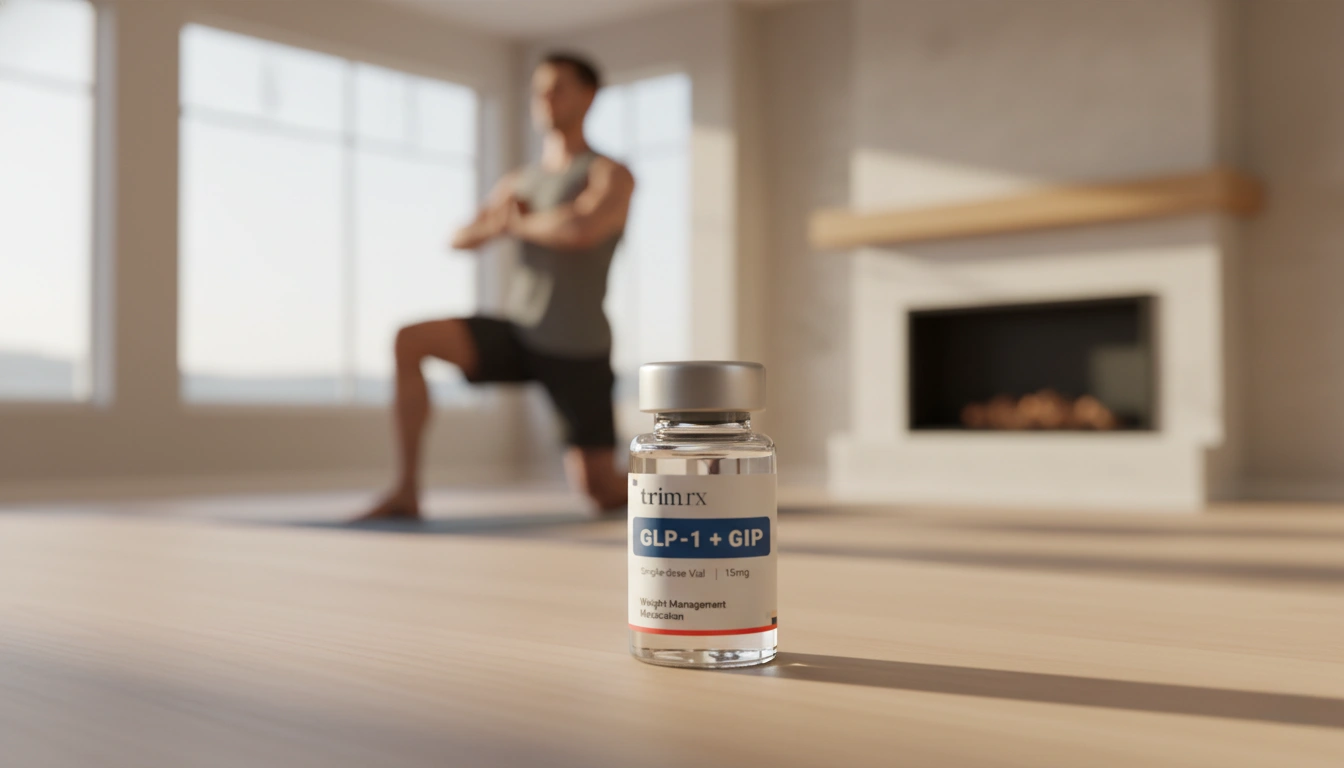How to Get Rid of Bloating on GLP-1 Medications: Strategies for Relief

Introduction
Have you ever felt an uncomfortable fullness in your abdomen after a meal, especially while on a weight-loss journey? You’re not alone. Many individuals who use GLP-1 medications, like semaglutide (Wegovy) or tirzepatide (Mounjaro), often report bloating as a common side effect. In fact, studies suggest that up to 70% of patients experience some gastrointestinal discomfort when starting these treatments. This can be frustrating, especially when you’re working hard to achieve your weight loss goals.
At TrimRx, we understand the complexities of weight loss and the unique challenges that come with it. Our mission is to provide personalized, medically supervised weight loss solutions that help individuals navigate their health journeys effectively. In this blog post, we will explore why bloating occurs with GLP-1 medications, effective strategies to manage it, and how to make your weight loss experience as comfortable as possible.
By the end of this article, you will gain insights into dietary adjustments, lifestyle changes, and practical tips to alleviate bloating while using GLP-1 medications. We will also discuss when it’s essential to seek medical advice, ensuring that you feel empowered to make informed decisions about your health.
Let’s delve into the details of managing bloating on GLP-1 medications and how these strategies can support your overall well-being.
Understanding GLP-1 Medications
What Are GLP-1 Medications?
GLP-1 (glucagon-like peptide-1) medications are a class of drugs that mimic a hormone in the body responsible for regulating appetite and glucose levels. These medications, including semaglutide (Wegovy) and tirzepatide (Mounjaro), are FDA-approved for weight loss in individuals with obesity or type 2 diabetes.
They work by slowing gastric emptying, which means they delay the movement of food from the stomach to the intestines, helping you feel fuller for longer. While this action aids in weight loss, it can also lead to digestive side effects such as bloating, gas, and constipation.
The Connection Between GLP-1 Medications and Bloating
Bloating occurs as a result of the slowed gastric emptying mentioned earlier. When food takes longer to digest, it can cause a buildup of gas in the digestive tract. Additionally, dietary changes that often accompany weight loss efforts—such as increased fiber intake—can also contribute to bloating.
Understanding this connection is crucial as it allows us to implement effective strategies to manage these symptoms. At TrimRx, we believe in addressing these challenges head-on, ensuring our clients can achieve sustainable weight loss without unnecessary discomfort.
Dietary Adjustments to Alleviate Bloating
Embrace a High-Fiber Diet
Increasing fiber intake is one of the most effective ways to improve digestive health. However, when starting a GLP-1 medication, it’s essential to gradually introduce fiber into your diet to avoid overwhelming your system. Aim for a minimum of 30 grams of fiber per day from sources like whole grains, fruits, vegetables, legumes, and nuts.
Here are some fiber-rich foods to consider incorporating into your meals:
- Fruits: Apples, pears, berries, and oranges are excellent sources of fiber and hydration.
- Vegetables: Carrots, broccoli, Brussels sprouts, and leafy greens not only provide fiber but also essential nutrients.
- Legumes: Beans, lentils, and chickpeas are rich in fiber and protein, which can help you feel fuller longer.
- Whole Grains: Incorporating oats, quinoa, and brown rice can enhance your fiber intake as well.
Stay Hydrated
Drinking plenty of water is crucial when increasing fiber intake, as it helps to soften stools and promote regular bowel movements. Aim for 48 to 64 ounces of water daily. However, it’s advisable to avoid consuming large volumes of water during meals, as this can contribute to bloating.
Mindful Eating Practices
How you eat can be just as important as what you eat. Engaging in mindful eating can help reduce bloating by allowing your body to better digest food. Here are some tips to practice mindful eating:
- Eat Slowly: Take time to chew your food thoroughly. This not only aids in digestion but also enhances your enjoyment of meals.
- Smaller, More Frequent Meals: Rather than consuming three large meals a day, consider eating smaller portions more frequently. This can help prevent the feeling of fullness and discomfort associated with large meals.
- Limit Carbonated Beverages: Carbonated drinks can introduce additional gas into your digestive system, leading to increased bloating.
Consider Probiotics
Some individuals find relief from bloating by incorporating probiotics into their diets. Probiotics are beneficial bacteria that can support gut health. While clinical evidence is limited, many patients report positive results. If you’re considering adding probiotics to your regimen, consult with your healthcare provider first.
Lifestyle Changes to Support Digestive Health
Engage in Regular Physical Activity
Regular exercise is a great way to support digestive health and alleviate bloating. Physical activity helps stimulate the digestive system, promoting the movement of gas through the intestines. Consider incorporating gentle exercises such as:
- Walking: A brief walk after meals can help digestion and reduce bloating.
- Yoga: Specific yoga poses, such as the bridge pose and seated recline twist, can relieve trapped gas and alleviate discomfort.
- Gentle Stretching: Stretching can help ease tension in the abdominal area, promoting better digestion.
Practice Abdominal Self-Massage
Abdominal self-massage can be a soothing technique to relieve bloating. By gently massaging the abdomen in a circular motion, you can help encourage the movement of gas and ease discomfort. This practice is simple and can be done at home while lying down.
Maintain Good Posture
Maintaining good posture while eating can significantly impact how your body digests food. Sitting up straight reduces pressure on the stomach, making it easier for food to move through the digestive system.
When to Seek Medical Advice
While bloating is a common issue associated with GLP-1 medications, it’s essential to recognize when it may require medical attention. Here are some red flags to watch for:
- Severe or worsening abdominal pain
- Bloating that persists beyond two to three weeks
- Significant distress that interferes with daily activities
- Signs of an allergic reaction, such as swelling, rash, or difficulty breathing
- Bloating accompanied by persistent vomiting or an inability to keep fluids down
If you experience any of these symptoms, we encourage you to consult your healthcare provider for guidance.
Conclusion
Managing bloating while using GLP-1 medications doesn’t have to be a daunting task. By implementing dietary adjustments, engaging in mindful eating practices, and incorporating lifestyle changes, you can significantly reduce bloating and enhance your overall comfort during your weight loss journey.
At TrimRx, we’re committed to providing you with personalized, medically supervised weight loss solutions that meet your unique needs. Our approach combines advanced medical science with compassionate care, ensuring that your weight loss journey is both effective and comfortable.
If you’re curious about how TrimRx can support your weight loss goals, we invite you to take our free assessment quiz to see if you qualify for our personalized prescription weight loss medications. Together, we can pave the way to a healthier you.
FAQ
Does bloating affect my weight loss results?
No, experiencing bloating does not diminish the effectiveness of your GLP-1 treatment. It is simply a side effect of how the medication works.
Should I stop taking my medication if I experience bloating?
Do not discontinue your medication without consulting your healthcare provider. Most bloating symptoms can be managed with appropriate strategies.
Can probiotics help with GLP-1-related bloating?
Some patients report improvement with probiotic supplements, but clinical evidence is limited. Always consult your healthcare provider before starting any new supplements.
Is bloating worse with higher doses?
Bloating may temporarily worsen when dosages are increased, which is why GLP-1 treatments typically follow a gradual dose escalation schedule.
How can I tell the difference between normal bloating and a more serious issue?
Normal bloating is uncomfortable but not severely painful. If you experience intense pain, fever, or severe distension, seek medical attention immediately.
By understanding how to manage bloating effectively, you can focus on your weight loss goals with confidence and comfort. Remember, at TrimRx, we are here to support you every step of the way.

Transforming Lives, One Step at a Time
Keep reading
China’s Supreme Court Upholds Semaglutide Patent for Novo Nordisk
China’s Supreme People’s Court upholds Novo Nordisk’s semaglutide compound patent, supporting IP protection.
Over 600,000 Californians Risk Losing Access to GLP-1 Weight-Loss Drugs
California’s Medi-Cal will stop covering GLP-1 weight-loss drugs for weight-loss-only prescriptions, effective Jan. 1, 2026.
Weight-Loss Pill Approval Likely to Prompt Overhaul of Packaged Food and Fast-Food Products
FDA approval of GLP-1 weight-loss pills may prompt food makers and restaurants to shift to high-protein, smaller-portion products.



